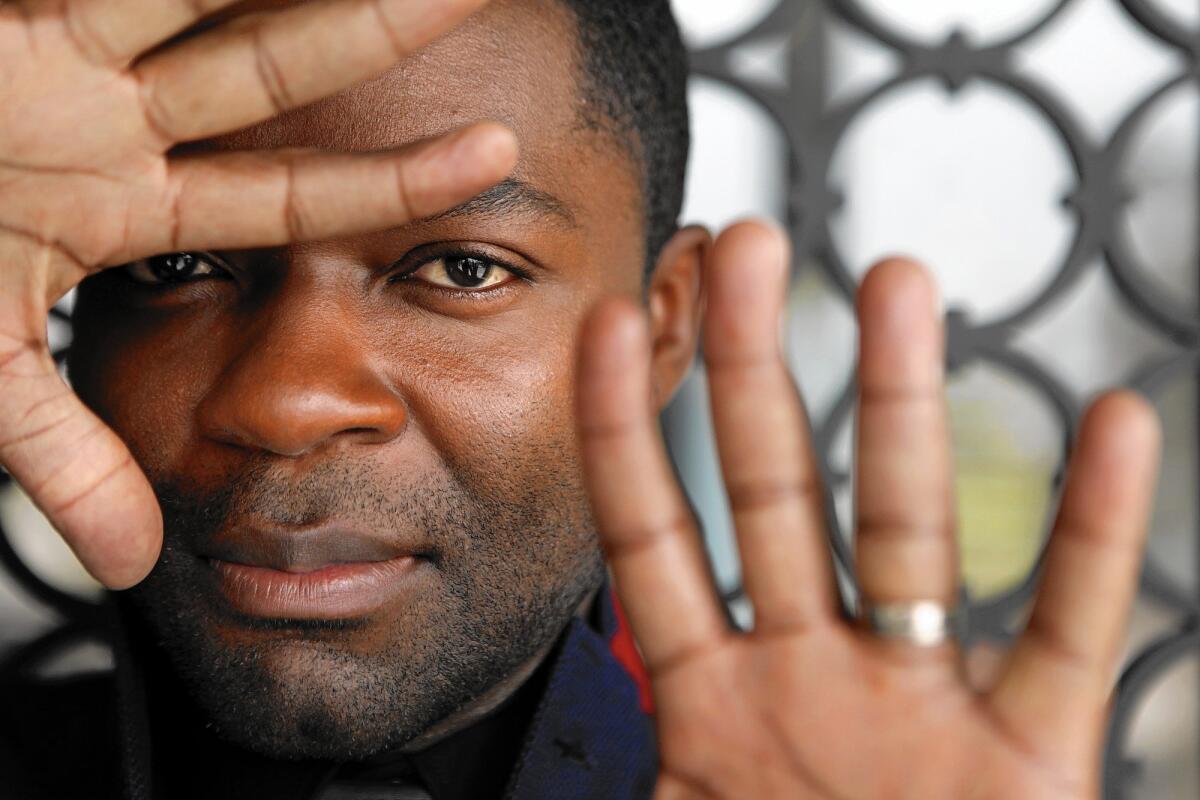David Oyelowo surprises students at Pan African film festival screening of ‘Selma’

David Oyelowo starred as the Rev. Martin Luther King Jr. in “Selma.”
- Share via
When the Rev. Martin Luther King Jr. biopic “Selma” hit theaters on Christmas in 2014, its studio Paramount Pictures announced that it would be screened free for nearly 300,000 middle and high school students. Over a year later, the Ava DuVernay-directed film continues to educate audiences, this time with its leading man David Oyelowo in tow at the Pan African Film and Arts Festival.
Oyelowo surprised a theater of almost 100 young people Friday who had just watched the film, some for the first time.
“Am I in this movie?” he asked amid applause and exclamations from the crowd. “As you can tell, I don’t sound like anything you saw in the movie.”
The screening was part of the 20-year-old student program of the festival, which ends Monday. About 7,000 students and teachers from schools in Los Angeles County attend screenings of pictures dealing with issues important to youth: teen pregnancy, AIDS prevention, literacy, cultural and racial respect, gang prevention, etc. In addition to “Selma” this year, students from schools including Crenshaw High and George Washington Preparatory will see “A Girl Like Grace,” starring Meagan Good, Raven-Symone and Garcelle Beauvais, as well as the documentary “He Named Me Malala.”
Oyelowo answered questions posed by the students. Some of his responses are below:
How did it make you feel playing King?
Well, it made me realize I am nothing like Martin Luther King. I have a wife and four kids myself, [just like him]. If I knew that, let alone my life, but their lives were under threat every day for 13 years, I don’t know whether I could’ve carried on in the way he did. Every time he left home, went to sleep, was giving a speech, there was always that threat that they would be assassinated because of the stance he had taken for civil rights. I love my kids and my wife. The idea that my actions, my political activism was a threat to their lives, I may have reconsidered. But that was the amazing thing about him. He realized that what he was doing was not only going to save lives in the present, but was much bigger than him. I don’t know that I could’ve done it, but I’m very glad he did.
Any words of advice for young people about being politically active?
In about a year or so, some of you will be allowed to vote. That’s a very important thing. If you live in this country and are a citizen of this country and are concerned about your taxes, how the government operates in terms of the military or healthcare, the only way you really have a say is by voting. The minute you don’t, you kind of take yourself out of the conversation and in many ways you relegate your right to be angry with the government or oppose it, because you’re not doing your part in choosing the government.
I’d also speak about social responsibility. You can be socially responsible within your family, community, school. If you see injustice, if you see that someone is being bullied, you can speak out on that person’s behalf because that is an injustice. If you see or are aware of someone who is being abused, whether at home or in a more public way, whether it’s sexual abuse, emotional, physical abuse, I would say it is socially responsible to speak out on behalf of those who may feel like they don’t have a voice for themselves. As individuals, you can be examples.
Did the role change you?
Well, playing Dr. King meant I had to be fatter than I am. [laughs] That was pretty tough. When you have six weeks to put on 30 pounds, that wasn’t so much fun. So that changed me physically, which wasn’t so much fun for my wife. But, apart from that, for me, playing this role was a spiritual endeavor. When I watched footage of Dr. King -- I’m a Christian and myself and I know what it is to be operating in what I would call your anointing -- I could tell that this wasn’t just a man who was good at oratory. There was something coursing through his veins that just led to people being inspired by what he was saying. I truly believe it was because he was in the red-hot eye of his calling. So, for me, portraying that is not something you can act. I had to just do the work and pray that God would move through me in a way that people believed they were seeing something in the way of Martin Luther King. I felt that, and that changed me.
How did you go about mastering your accent?
People often ask me that because I’m English, but I would argue that even if you were American and you were going to play Dr. King, it’s a tall order. I mean, he spoke funny. [laughs] It wasn’t even just an Atlanta accent, but it had the Southern Baptist preacher element, some Boston sounds and he used big words all the time. And he had this rhythm in his speeches. So anyone would have to study that accent. But, the amount of time it took to do the film helped. I killed myself to get it right.
Get your life! Follow me on Twitter: @TrevellAnderson.
More to Read
Only good movies
Get the Indie Focus newsletter, Mark Olsen's weekly guide to the world of cinema.
You may occasionally receive promotional content from the Los Angeles Times.










